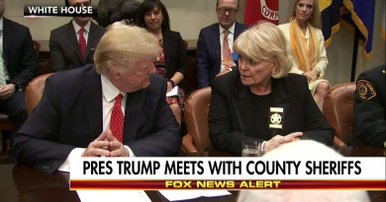
At a meeting on Tuesday with sheriffs from around the country, President Donald Trump joked about destroying the career of an unnamed Texas state senator who supported curtailing a controversial police practice for seizing people’s property.
At the meeting, Trump asked the assembled sheriffs if anyone wanted to “make a statement as to how we can bring about law enforcement in a very good civil lovely way, but we have to stop crime, right?”
Sheriff Harold Eavenson of Rockwall County, Texas, brought up the issue of civil asset forfeiture, which allows authorities to seize cash and property from people suspected, but in some cases never convicted or even charged, with a crime.
Eavenson told Trump of a “state senator in Texas that was talking about legislation to require conviction before we could receive that forfeiture money.”
“Can you believe that?” Trump interjected.
“And,” Eavenson went on, “I told him that the cartel would build a monument to him in Mexico if he could get that legislation passed.”
“Who’s the state senator?” Trump asked. “Do you want to give his name? We’ll destroy his career,” he joked, to laughter from the law enforcement officials in the room.
Eavenson did not share the senator’s name.
While many people are unfamiliar with the practice, asset forfeiture is widespread. In 2014, federal authorities alone seized over $5 billion from suspected criminals, more than the total losses to burglary that year. That number doesn’t even count seizures conducted by state and local law enforcement.
Critics of assets forfeiture policies say the broad leeway afforded to law enforcement officers in most states creates a system ripe for abuse. In 2014, for instance, Oklahoma police took $53,000 in cash from the manager of a Burmese Christian band because they didn’t like his explanation for why it was in his car. They eventually returned it after a Washington Post story highlighted the case.
A 2015 ACLU investigation found that Philadelphia police routinely seized what amounted to “pocket change” from some of the city’s poorest residents. A 2014 Washington Post investigation found that police seized $2.5 billion in cash from motorists not charged with crimes as part of a federal program.
When told of the practice, a large majority of Americans are opposed to it. A December 2016 survey by YouGov and the libertarian Cato Institute found that 84 percent of Americans oppose taking “a person’s money or property that is suspected to have been involved in a drug crime before the person is convicted of a crime.”
A broader YouGov survey, conducted in 2015, found that 71 percent of Americans agreed that “law enforcement should only be able to permanently seize money or other property if that person is charged with and convicted of a crime.” Only 7 percent said that police should be able to make such seizures if no criminal charges had been filed.
But law enforcement groups have been resolute in their support for the practice. They say seizing money from people not charged with crimes is sometimes necessary to protect public safety, particularly in cases where it may be hard to obtain a criminal conviction against a suspect.
Law enforcement groups often cast asset forfeiture as a tool for fighting drug kingpins and foreign drug cartels, as Sheriff Eavenson implied at the White House meeting. But reports of asset forfeiture abuse suffered by American citizens have become more common. Nonetheless, police have had great success in convincing state and federal lawmakers to uphold the practice.
Donald Trump has not spoken much about the practice, and the White House did not immediately return a request for comment. But Trump’s nominee to lead the Justice Department, Senator Jeff Sessions, has been an enthusiastic proponent of civil asset forfeiture. In a 2015 Senate hearing, Sessions said that “95 percent” of forfeitures involve suspects who have “done nothing in their lives but sell dope.”
It’s unclear which state senator Sheriff Eavenson was referring to. In December, Texas state senator Konni Burton introduced a bill to require criminal conviction before forfeiture. Neither Eavenson or Senator Burton were immediately available for comment. Eavenson declined to share the name of the senator with the Dallas Morning News.
Trump has been steadfast in his support for stronger law enforcement measures. During the presidential campaign he promised to “make America safe again,” and more recently condemned what he called the “dangerous anti-police atmosphere in America.”
His views on law enforcement are shaped in part by his false belief that the murder rate is at a nearly five-decade high.
(c) 2017, The Washington Post · Christopher Ingraham

